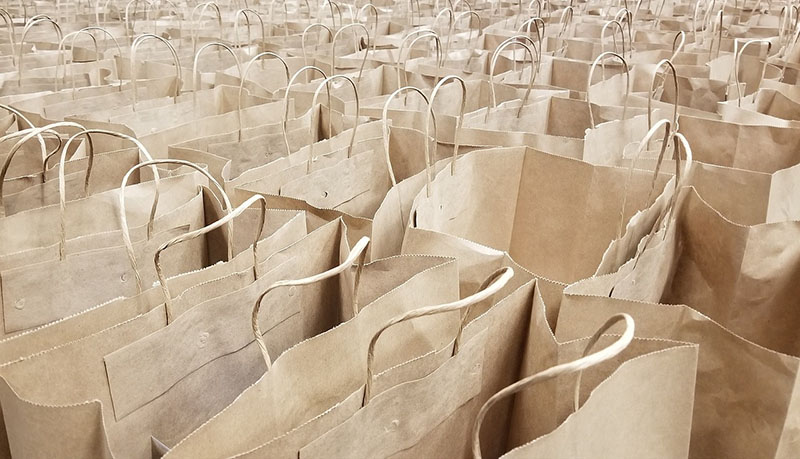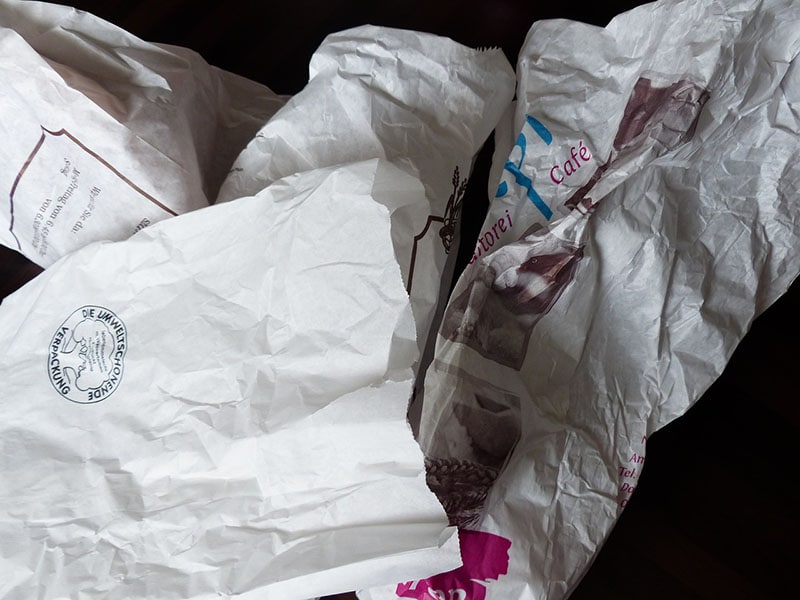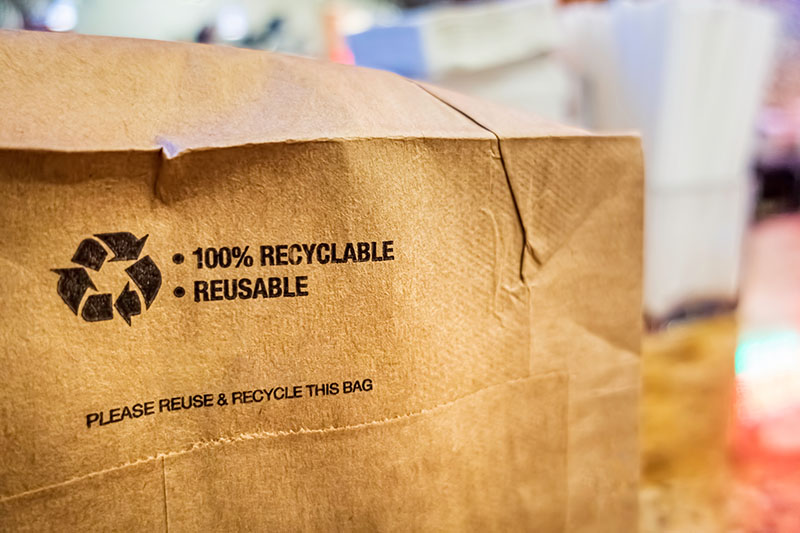Are Paper Bags Recyclable? How Do You Properly Dispose of Them?
-
Pete Ortiz
- Last updated:

Paper bags are a great alternative to plastic for shopping, gifting, and preparing kids’ lunches, but are they recyclable? Paper bags can be recycled, but like most recyclable products, they need to be free of food particles, ink, plastic, and other contaminants.
In this article, we’ll discuss how paper bags can be recycled and reused and if they are truly the better option.
Can Paper Bags be Recycled?

Recycling your paper bags can contribute to the conservation of natural resources in the paper industry as they can be recycled to manufacture new paper. Every ton of paper that is recycled saves up to 17 trees, 2 barrels of oil, and 4,100 kilowatts of energy. Paper recycling also aids in the reduction of greenhouse gas emissions, which can contribute to climate change.
Paper bags can be recycled if they are free from food, grease, ink, plastic, and other contaminants. Paper bags also come in varieties, so it may also depend on what kind of bags need recycling. Most paper lunch bags, gift wrapping, and grocery bags can be disposed of along with your curbside recycling or dropped off at a recycling center.
Some shopping bags may pose a problem because several are produced with a combination of paper and plastic to increase their durability. Paper bags manufactured this way cannot be recycled but reused. Before you throw it into your recycling, determine whether it is manufactured using plastic. A sheen on the outer coating of the bag is usually a giveaway.
Paper bags that include adhesives, such as those with handles that are glued on, are usually water-soluble. Any paper mill that can process mixed paper can remove these adhesives during the recycling process, but it’s important to check if your area recycles mixed paper before disposing of it with your recycling.
However, there are limitations to recycling paper. The fibers of the paper become shorter and weaker with each recycling cycle, which means it can only be recycled up to 6 times before becoming too weak to be used. Given the benefits of recycling paper, this is a minor drawback.
How to Dispose of Paper Bags
If your paper bags are soiled, you will need to throw them away or remove the soiled areas to avoid contaminating the recycling stream. Some bags come with handles that are made from the same paper, in which case, the whole bag can be added to the recycling, but if the handles are made from plastic or string, they will need to be removed.
If you have a compost bin at home, it is an excellent option for disposing of your paper bags, and some might say it’s even better than recycling. When you are done with your bags, tear them up into small pieces and throw them into your compost heap. Again, if there are plastic or string handles, you will need to remove them, and if the paper bags are manufactured using a mix of plastic, they are not suitable for composting.
Are Paper Bags the Better Option?

Paper bags are not very durable. They can become wet and tear and can’t be reused as much as plastic bags. Deforestation is just one environmental tragedy resulting from paper production, and paper bags are a product of the paper industry. Deforestation disrupts our natural ecosystem and will have dire long-term effects. The manufacturing process also increases carbon emissions, and environmentally harmful chemicals are usually used in paper processing facilities.
However, when it comes to composting, paper bags come out on top. Plastic bags usually make their way to a landfill, where they will remain for hundreds of years, whereas paper bags are biodegradable and can easily be composted.
Paper is an ideal material for grocery bags since it is easily recyclable and has a lower environmental impact. While plastic bags are recyclable, most recycling centers do not accept them, but they’re more reusable than paper bags. The best option is to purchase reusable shopping bags. Some of them are even made with recycled materials such as hemp or bamboo. Keep them in your car and make sure they are easily accessible, so you don’t forget them and end up with unnecessary plastic bags.
How You Can Reuse Your Paper Bags
If you cannot recycle or dispose of your paper bags, there are great ways that they can be reused and upcycled.
- If your paper bags are still strong, you can use them to hold miscellaneous items such as clothes, books, and toys while transporting, storing, or donating.
- You can use your larger paper bags as a container for other paper that can be recycled.
- Use your paper bags instead of plastic garbage can liners. While this is a great idea, you will need to be cautious of liquid waste that will cause the bag to get wet and weak, which can result in tearing and leaking on your way to the dumpster.
- They can also be used to collect compostable kitchen waste, and the whole bag can be added to the compost heap.
- Paper bags that aren’t soiled can make great gift wrapping and a fun project for the kids to decorate.
- They can be used to cover books to protect them, such as a recipe book used frequently in the kitchen by a messy cook or a kid’s textbooks and workbooks at school.
- If you are an avid flower gardener and often give your blooms to loved ones, you can use paper bags to wrap your bouquets.
- Paper bags are great for kids and can be used for drawing and painting paper, scrap paper for creating costumes, bookmarks, placemats for other messy creations, or any other use your imaginative child can think up.
Conclusion
For the most part, paper bags can be recycled. As long as the paper is not soiled with food and contaminants and is not manufactured with a mix of plastic, you can add your paper bags to your recycling. Consider throwing your paper bags into your compost pile for the best disposal. They are biodegradable, and you’ll ensure they will not end up in a landfill. Also, consider reusing them a few times before you dispose of them.
Featured Image Credit: Karah Hawkinson, Pixabay
Contents


